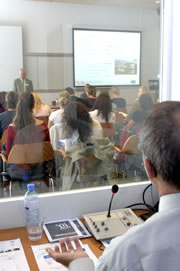The Value of the Pilot Projects for the Curriculum Guidelines
The pilot projects performed a two-fold function for the curriculum guidelines:
- In the first place, they served as a “practice field” for the implementation of initially formulated CHAGAL principles.
- By analysing and evaluating these “samples of good practice”, new aspects and insights for the final conceptualisation of the CHAGAL Curriculum Guidelines could be gained.
In summary, one can say that the pilot projects have addressed and at the same time fostered the major CHAGAL concepts by focusing on the following aspects of teaching and learning:
 The
Promotion of the Target Group’s Integration
The
Promotion of the Target Group’s Integration
A considerable number of projects aimed at helping students to integrate more quickly and with ease into the target society, thus trying to reduce “culture-shock” symptoms.
The Raising of Awareness
Awareness-raising as a cognitive concept is a crucial element of a student-centred approach which can be conceived from the perspective of the teaching-learning relationship. Then it becomes obvious that there is no direct or automatic relation between teaching and learning. Learning which remains “on the surface” (i.e. the mere reproduction of knowledge) is unlikely to lead to successful performance in academic settings (the “surface” vs. “deep” learning dichotomy).
In this context a big challenge to every institution is the question of how to accredit students’ achievements. The CHAGAL approach favours a flexible, “learner-friendly” system that accounts for the nature of adult learning styles and preferences and also accredits the production of partial results.
 Awareness-raising
can also be seen from the perspective of self-regulated (autonomous) learning/student’s
self-reflection. This meta-cognition, i.e. the ability to think about one’s
own learning process and the development of skills which can be applied in
different settings is of great importance. In a large number of projects the
enhancement of study skills in a more restricted sense (e.g. note-taking,
using media and the Internet, presentation techniques, receiving and giving
feedback) was a major concern. In a broader sense, it is also important that
students are able to reflect on their whole “learner biography”,
comprising their cultural and educational background, their individual learning
styles and strategies, their techniques and world knowledge.
Awareness-raising
can also be seen from the perspective of self-regulated (autonomous) learning/student’s
self-reflection. This meta-cognition, i.e. the ability to think about one’s
own learning process and the development of skills which can be applied in
different settings is of great importance. In a large number of projects the
enhancement of study skills in a more restricted sense (e.g. note-taking,
using media and the Internet, presentation techniques, receiving and giving
feedback) was a major concern. In a broader sense, it is also important that
students are able to reflect on their whole “learner biography”,
comprising their cultural and educational background, their individual learning
styles and strategies, their techniques and world knowledge.
Finally, awareness-raising touches upon the language training vs. discipline
training dilemma. Awareness as such has to be developed according to the different
learning demands posed by learning a second language as compared to the acquisition
of knowledge in a natural science discipline.
A number of pilot projects showed ways in which these different learning areas could be fruitfully combined. Group work and group presentations especially foster social learning and the development of soft/personal skills; so does time management. Students learn how to cooperate and accept different opinions which seems to be a fundamental prerequisite especially for multicultural groups. Besides, cooperative learning can enhance the learning of other students who are not at the same level of “understanding”.
The Use of Questionnaires
One major concern of CHAGAL is to find out about students’ objective and subjective needs. As a tool for information retrieval questionnaires are very useful. Questionnaires are very useful, since they enable the students
- To express their needs, feelings, and expectations in an anonymous way;
- To reflect on and evaluate their learning process and performance;
- To give guided feedback to teachers and fellow-students.
At the same time, feedback from questionnaires can provide a basis for teachers on which to improve their teaching concepts and methods.
Process- and Product-Oriented Approach
While it is clear that learning as a whole is best conceived as a process, some projects deliberately aimed at having a “product” (e.g. a booklet) as a final result. This accounts for the need of some learners to have some “tangible” outcome of their learning effort as proof of their achievements.
Table of Pilot Projects (by thematic groups)
Social/Cultural Learning-Oriented Projects
- PP 3: “Introducing German Cultural Studies through Songs”
- PP 4: “Applied Cultural Studies – Outdoor Activities, Study Trips and Excursions in Vienna”
- PP 5: “Cultural Awareness Training (and Language Teaching)”
- PP 6: “Some Dos and Don’ts in Multicultural Settings: A Good
Guide to Bad Manners” - PP 7: “Learner’s Biography”
Content-Oriented Projects
- PP 9: “Second Language Oral Presentation for Content Classes”
- PP 10: “Implementation of a Learner-Centred Curriculum in Subjects Other than German as a Foreign Language Needs Analysis”
- PP 11: “Integration of English and Mathematics”
- PP 12: “Chemistry-Practical Training: The Measure Analysis”
- PP 14: “Elements of Self-Regulated Learning”
- PP 15: “Role Playing in the Consulting Room”
- PP 16: “Developing Presentation Skills in English for Specific Purposes (ESP)”
Language- and Study-Skills-Oriented Projects
- PP 1: “Speech Communication”
- PP 2: “Grammar Consciousness-Raising Tasks”
- PP 8: “Improving Study Skills by Social Learning in Class”
- PP 13: “Evaluation of VGU by Former Students Presently Studying at one of the Graz Universities”
The CHAGAL Pilot Projects’ Instructors
Studienkolleg der Universität des Saarlandes, Saarbrücken / DE
Contact: Roland Forster roland.forster@t-online.de
2) Grammar Consciousness-Raising Tasks
VGU - Vorstudienlehrgang der Grazer Universitäten / University Preparation
Programme of the Graz Universities / AT
Contact: Manfred Schifko & Wilfried Krenn
wilfried.krenn@kfunigraz.ac.at
schifko@gewi.kfunigraz.ac.at
3) Introducing German Cultural Studies through Songs
Studienkolleg der Universität des Saarlandes, Saarbrücken / DE
Contact: Andrea Schmitt
a.schmitt@stk.uni-sb.de
VWU - Vorstudienlehrgang der Wiener Universitäten / University Preparation
Programme of the Vienna Universities / AT
Contact: Martina März & Matthias Bohun
martina.maerz@gmx.net
matthias.bohun@gmx.at
5) Cultural Awareness Training (and Language Teaching)
VWU - Vorstudienlehrgang der Wiener Universitäten / University Preparation
Programme of the Vienna Universities / AT
Contact: Monika Fritz (pilot project in cooperation with Hannes Vogler &
Imke Mohr)
fritzmonika@hotmail.com
VWU - Vorstudienlehrgang der Wiener Universitäten / University Preparation
Programme of the Vienna Universities / AT
Contact: Hannes Vogler (pilot project in cooperation with Monika Fritz) hannes.vogler@univie.ac.at
Studienkollegs Aachen/Köln/Köthen/ DE
Contact: Resi Beckers & Mahmoud Chemli & Peter Roth & Gisela Haack
ruhbeck@t-online.de
miskillil@yahoo.de
Peter_Roth800@hotmail.com
knoth@stk.hs-anhalt.de
8) Improving Study Skills by Social Learning in Class
VWU - Vorstudienlehrgang der Wiener Universitäten / University Preparation
Programme of the Vienna Universities / AT
Contact: Sigrid Stiglitz & Julia Thurnher
stiglitz@aon.at
juliathurnher@surfeu.at
9) Second Language Oral Presentations for Content Classes
VASVU - Free University of Amsterdam – Preparatory Year for International
Students Amsterdam / NL
Contact: Jon Ruijmschoot & Chris van Veen
j.ruijmschoot@let.vu.nl
cm.van.veen@let.vu.nl
VGU - Vorstudienlehrgang der Grazer Universitäten / University Preparation
Programme of the Graz Universities / AT
Contact: Eva Gergely & Lieselotte Hölbling & Ursula Schwab-Harich
& Astrid Trathnigg
eva.gergely@aon.at
lieselotte.hoelbling@kfunigraz.ac.at
schwab-harich@tugraz.at
vgu@online.asn-graz.ac.at
11) Integration of English and Mathematics
VASVU - Free University of Amsterdam – Preparatory Year for International
Students Amsterdam / NL
Contact: Aleid Knoote & Wilfried Meffert & Kees Smit
as.knoote@let.vu.nl
cwm.meffert@let.vu.nl
cp.smit@let.vu.nl
12) Chemistry - Practical Training: The Measure Analysis
Studienkolleg bei den Fachhochschulen des Freistaates Bayern in Coburg /
DE
Contact: Irene Schönfeldt
schoenfi@fh-coburg.de
13) Evaluation of VGU by Former Students Presently Studying at one of the Graz Universities
VGU - Vorstudienlehrgang der Grazer Universitäten / University Preparation
Programme of the Graz Universities, in cooperation with Afro-Asian Institute,
Graz / AT
Contact:Henriette Pire/Bernhard Unterweger/Helga Wenzl/Elga Wolf
h_pire@styria.com
bernhard.unterweger@telering.at
helga.wenzl@chello.at
elga.wolf@utanet.at
14) Elements of Self-Regulated Learning
Studienkolleg der Universität Münster / DE
Contact: Horst Nellessen
nelless@uni-muenster.de
15) Role Playing in the Consulting Room
James Boswell Institute, Utrecht / NL
Contact: Aukje Spoelstra & Barbara van Diest
a.spoelstra@jbi.uu.nl
b.vandiest@jbi.uu.nl
16) Developing Presentation Skills in English for Specific Purposes (ESP)
Technical University of Sofia – Plovdiv Branch, Plovdiv / BG
Contact: Penka Taneva – Kafelova
bonafide@plovdiv.techno-link.com